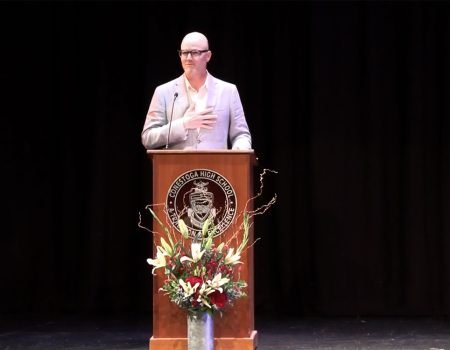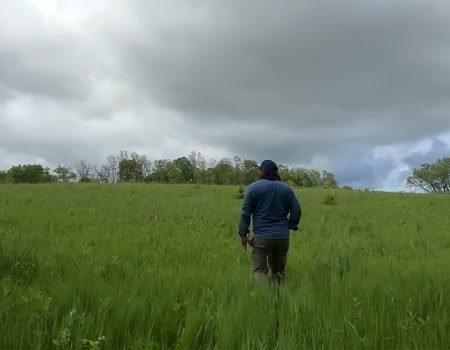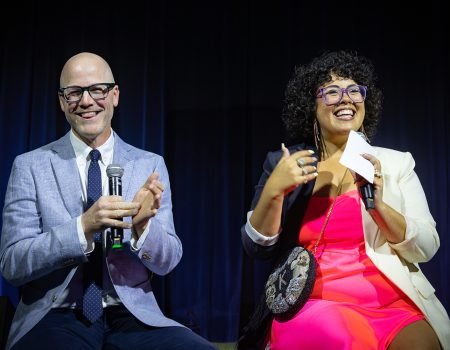Megan Watkins: She Sells Sanctuary
Even as a kid from Iowa, I imagined farms as bucolic, self-sustaining places: silos full of corn to feed cute, muddy pigs; fresh milk from a well-loved heifer; eggs from the family hen.
But of course, farming hasn’t been a ma ‘n pop operation for years. It’s big, big business: pesticides, fertilizers, antibiotics, growth hormones.
In the US, nearly 10 billion animals are killed for human consumption each year in the United States. 99% are raised on factory farms. 80% of agricultural land is used to raise those animals to slaughter, or to grow their feed.
If US crops were directed towards food for humans, instead of for livestock, we could feed three times more people than today — helping the 1 in 10 US families that don’t have enough to eat.
The UN says that animal agriculture “is exerting mounting pressure on the world’s natural resources,” contributing to land degradation, species loss, water pollution and waste. Animal agriculture is responsible for 14.5% of greenhouse gasses, and according to the CDC, 75% of emerging infections.
A plant-based diet, by contrast, can have innumerable health benefits like lower blood pressure, lower cholesterol, and a lower risk of heart disease, type two diabetes and certain cancers.
But what with sanitized, cartoonishly-bucolic packaging, relentless marketing (“Got milk?”) and — up until recently — a perceived lack of options, who would know? Or know what to do about it?
Agribusiness has a stake in keeping you in the dark; there are $1B dollars worth of agribusiness advertising making every effort to keep cows in slaughter, and cheeseburgers on the table.
Enter Farm Sanctuary founded in 1986 by Gene Baur as an advocate organization for farmed animals. Today, the nonprofit based in Watkins Glenn, NY, promotes laws and policies that support animal welfare, animal protection, and veganism through rescue, education, and advocacy.
Meg is right out front, thoughtfully, gently but firmly meeting people where we are, and letting the innate connection we feel with all living things, and the imperative to protect our planet, lead the conversation.
In our wide-ranging conversation, Meg and I discuss her upbringing in Newton, Mass; her experience building community at Barnard College and beyond; and the moment she knew what she had to do to align herself with her values.
Fred Rogers famously said that he “couldn’t eat anything that had a mother.”
When you hear the stories, get the data, see the imagery, and feel the love, living your values — compassion, empathy, kindness, stewardship — becomes sort of a no-brainer. But that doesn’t mean it’s obvious, or easy.
When I learned that cheeseburgers accounted for more greenhouse gasses than automobiles, I changed my behavior .
But as the journey of 1000 steps begins with one, I began small: salads with nuts instead of chicken, plant based burgers instead of beef. Today, our family eats 80% less meat, easily. If everyone in America did the same, that would be real progress.
At his now-famous Dartmouth College Commencement Address, Fred Rogers said, “When I say it’s you I like, I’m talking about that part of you that knows that life is far more than anything you can ever see, or hear, or touch. That deep part of you, that allows you to stand for those things, without which humankind cannot survive. Love that conquers hate. Peace that rises triumphant over war. And justice that proves more powerful than greed.”
This is Meg’s work.
And this is what all of our work looks like.
It may not come in the form of an assignment, or a task, or a strategy or a day job or board election. It may not come with budget or a logo or a workback plan. And it probably won’t end in plumes, fireworks or a promotion.
It may just be an instant, an otherwise afterthought every day, or every so often.
What will you choose?
“In all that you do, in all of your life,” Fred finished. “I wish you the strength and the grace to make those choices which will allow you and your neighbor to become the best of whoever you are.”
Download “Friends & Neighbors” on Apple, stream on Spotify; watch on Facebook or YouTube; and subscribe to our newsletter.



